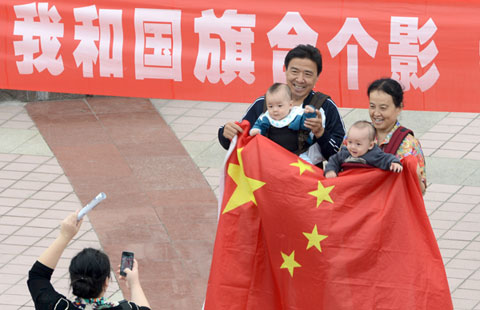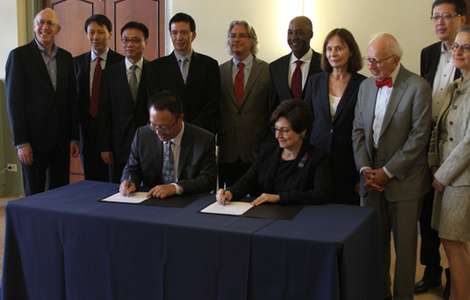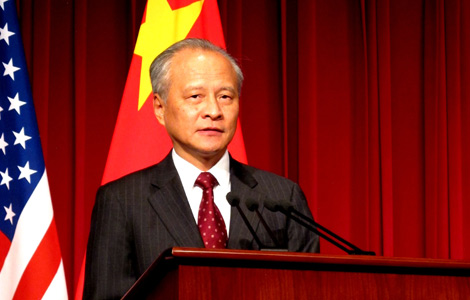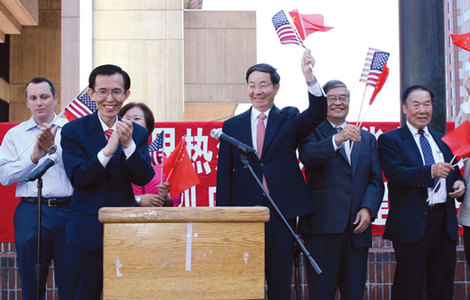Currency swap potential boon to Argentina
Updated: 2014-09-29 06:59
By JACK FREIFELDER in New York(China Daily Latin America)
|
||||||||
As Argentina works to counter the negative effects of the country's second economic default in the last 13 years, negotiations around the implementation of a bilateral swap agreement (BSA) between China and Argentina could be a boon to the fortunes of the Latin American nation, according to an economist.
Eugenio J. Aleman, a senior economist with Wells Fargo & Co, said "currency swaps are not new" but this agreement with China "comes at an important time for Argentina".
"China is trying to broaden its influence in the world economy, and these currency swap agreements are intended to do just that," Aleman wrote in an email to China Daily. "China is trying to internationalize the use of the yuan, and signing swap agreements so that trade is increasingly carried using the Chinese currency is a way to do it.
"Argentina will probably benefit from the fact that the swap agreement will ease the pressure over scarce US dollars," Aleman said. "And from China's point of view, [the agreement] will increase the demand for the Renminbi as it marches toward establishing its currency as a reserve currency in the future."
On Sept 7, Chinese central bank chief Zhou Xiaochuan met Juan Carlos Fabrega, his Argentine counterpart, in Basel, Switzerland, to discuss further stages of how a currency swap agreement between the two countries would function going forward.
Shortly thereafter, Argentine daily newspaper La Nacion reported that the Central Bank of Argentina announced it is set to receive between $500 million and $1 billion from China before the end of the year, but no timetable has been set.
The initial sum comes as the first part of an $11 billion loan signed in July by Argentina's President Cristina Fernandez de Kirchner and Chinese President Xi Jinping.
According to a Sept 9 story in the Buenos Aires Herald, the terms of the currency swap deal stipulate that Argentina can send pesos to China in exchange for yuan and the loan would be payable in 12 months with an interest rate between 6 to 7 percent.
And any funds the Argentine Central Bank gets from China can be freely converted to US dollars in Hong Kong, London or Singapore before arriving in Argentina.
The deal is aimed at increasing the national foreign currency reserves in Argentina, especially given that the country has had limited access to international credit markets since its record $100 billion default in the latter stages of December 2001.
After Argentina fell into economic collapse in 2001-2002 and the currency devalued, it became increasingly difficult for the country to garner loans at the market rate.
In order to meet its international payments, Argentina has made use of foreign reserves, which fell to their lowest level in more than seven years, according to a Sept 8 report from Russian news provider Russia Today.
And international credit-rating agencies said Argentina entered default again at the end of July after US District Judge Thomas Griesa blocked a debt payment due to a long-standing conflict with vulture funds.
Nonetheless, the BSA between Argentina and China could be a strong sign of the growing relationship between the two, according to a September 2013 report titled Redback Rising: China's Bilateral Swap Agreements and RMB Internationalization.
The report's co-authors Daniel McDowell and Steven Liao argue: "Bilateral swap agreements (BSAs) can be seen as natural extensions to preferential trade agreements (PTAs) and bilateral investment treaties (BITs) in which they provide an additional layer of state-level formal cooperation in the international economy."
As such, the swap will allow Argentina to bolster its foreign reserves or pay for Chinese imports with the yuan currency at a time when weak export revenues and an ailing currency have put the Latin American nation's foreign reserves under intense pressure.
Marc Chandler, global head of Markets Strategy at Brown Brothers Harriman & Co, a New York-based investment bank and securities firm, said China has a number of bilateral swap agreements but "Argentina is a special case" given its default and its barring from foreign capital markets.
Both McDowell and Liao agree that China is looking to make a "continued push" in Latin America because of the high trade volumes that it maintains with the region.
"The swap may further benefit the economic development of Latin America if Chinese multinational corporations are using Argentina as a steppingstone for direct investments into the region," Liao told China Daily.
"For the last five years, China has been taking incremental steps to promote the international use of its currency," McDowell wrote in an email to China Daily. "The swap lines are an integral part of this plan, aimed primarily at promoting the use of the yuan in trade settlement. Today, Argentina's access to the global financial system is more limited than it was a few years ago so Argentina may be more likely to use the line out of sheer necessity."
Argentina is one of a number of economies worldwide that have already signed similar agreements with China, a group that includes the European Union, the UK, Brazil, Russia and South Korea.
jackfreifelder@chinadailyusa.com

 Chinese show love for country ahead of National Day
Chinese show love for country ahead of National Day
 Latest report on 100,000 Strong Initiative is discussed
Latest report on 100,000 Strong Initiative is discussed
 Dine Around Downtown returns for 13th year
Dine Around Downtown returns for 13th year
 Perfect World signs MoU with Columbia University
Perfect World signs MoU with Columbia University
 China, US bid to work together
China, US bid to work together
 Xinjiang's first high-speed railway to start operation
Xinjiang's first high-speed railway to start operation
 Ambassador's National Day greetings
Ambassador's National Day greetings
 It's time to celebrate
It's time to celebrate
Most Viewed
Editor's Picks

|

|

|

|

|

|
Today's Top News
First Ebola case reported in US: CDC
100 foreigners get Friendship Award
US firms remain optimistic about China
China marks first Martyrs' Day
Chinese, Indian troops withdraw from border standoff
China eases home purchase restriction
Protest continues in HK as bus service interrupted
Donation from Chinese group enables classes to keep going
US Weekly

|

|







